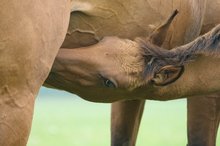It is important to vaccinate broodmares 4 to 6 weeks before foaling for their own protection, as well as to maximize concentrations of immunoglobulins in their colostrum to be passively transferred to their foals.

Maximize concentrations of immunoglobulins in colostrum
Horse owners need to recognize that vaccinating the mare is not sufficient for protection of the foal; passive transfer must also occur.
The significant majority of vaccines used in broodmares during late gestation to maximize immunoglobulin transfer via the colostrum do not carry a “safe for use in pregnant mare” claim. However, this is an accepted practice and clinical experience indicates these products are safe for this purpose, but if the practitioner has specific safety questions or concerns, he or she is encouraged to contact he manufacturer for additional information.
Recognize that simply vaccinating the mare is not sufficient for protection of the foal; successful passive transfer must also occur. The foal must receive adequate amounts of high quality colostrum and absorb adequate amounts of specific colostral immunoglobulins before absorption of macromolecules ceases (generally 24 to 48 hours). Specific colostral immunoglobulins provide protection against field infections for several months but also may interfere with vaccinal antigens and may interfere with foal responses to vaccines; a phenomenon termed “maternal antibody interference.”
Although protective concentrations of maternal antibody decline with time, vaccination of a foal while these colostral antibodies are present - even at concentrations less than those considered to be protective - is often of minimal value because of maternal antibody interference. Consequently, a foal may be susceptible to infection before the primary vaccinal series is completed. Management directed at minimizing exposure to infectious agents is key during this interval.
Foals with residual maternal antibodies generally produce a greater serologic response to killed vaccines when an initial series of three doses is administered rather than the 2-dose series recommended by most manufacturers of vaccines for older horses without residual maternal antibodies
